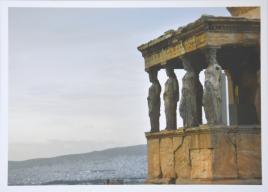
Making Greece known through its artistic and cultural heritage as well as its unseen, crisis-stricken aspects: it is the goal of “Solidarity Travels”, a project promoted by the Armenian Catholic Exarchate of Athens in conjunction with the Ark of the Mediterranean, a volunteering association of created by Caritas Foligno, with the support of Caritas Greece and Caritas Italy. The project offers tourist experiences where in addition to visiting Greece’s historical and artistic treasures, it is also possible to meet the members of the local communities and listen to their stories. The project extends beyond traditional tourist trails that conceal a crisis that continues weighing on the Country – albeit without making the headlines.

Seeing with different eyes. The initiative combines visits to the Parthenon or to Syntagma Square with the opportunity to enjoy the dishes of the Greek or Armenian culinary traditions in family-run restaurants, or the typical recipes prepared by Syrian, Afghani, Iraqi and African refugees.
“The program includes the possibility to devote an entire day doing volunteer work at a Caritas soup-kitchen or at the Neos Kosmos social house in Athens that hosts families, young people and refugees, ensuring hospitality to people in difficulty,” Father Joseph Bazouzou, Apostolic Administrator of Catholics of Armenian Rite in Greece, told SIR.
“The program envisages meetings with the volunteer workers of Caritas Athens, musical evenings and the visit to social projects – all of which make Athens a resilient and solidarity-based city.”
Two proposals. Two proposals – Athens Against the Crisis, and the pilgrimage “On the footsteps of Saint Paul” – are organized with the technical support of Greek travel agency Akron Travel, founded by a young man who had lost his job as a result of the crisis. “The first is addressed to adults (singles, couples, families) – said Mauro Masciotti, Director of Caritas Foligno – who wish to discover the supportive dimensions of the city of Athens, that is facing an economic crisis whilst showing solidarity towards refugees.”
Accommodation is offered in the Neos Kosmos neighbourhood, just two metro stops away from the Acropolis, at the guesthouse of the Catholic Armenian Exarchate of Father Bazouzou or at the Neos Kosmos Social House. Upon request it will be possible to stay in hotels that share the values of solidarity travels. The program includes the discovery of Athens walking along the streets of the city-centre accompanied by local guides who will tour the city “through the eyes and the experience of those who live it every day, amid difficulties, hopes, failures and rebirth; following the tracks of history and the intertwining of cultures, surrounded by Rembetika music, by the aromas and flavours of typical dishes, by people’s kindness and spontaneity.”
“The tour of invisible ones”, organized by a homeless association, is an item of particular interest along with the Migrant Tour, organized by refugees hosted in Caritas structures.
The second proposal is the pilgrimage “In the footsteps of Saint Paul”, enabling solidarity travellers to make an experience of faith by visiting the places of Saint Paul and the Apostle Andrew during their journey in Greece: (Patros, Korint, Kekries, Athens with the Aeropagus, Thessaloniki and Philippi), without overlooking the encounter with modern Greece, with its efforts and hopes, with today’s recipients of the Pauline letters.”
We cannot remain indifferent. As Greece strives to recover from economic difficulties, also a trip can become an instrument for solidarity, “an appointment of fraternity, an opportunity for the economic and social development of local communities. All it takes is to step out of your tourist shoes and into those of the traveller who wishes to understand, learn and be absorbed by the site he is visiting.”

Greece, its past, its myths, its archaeological sites, its sea, its beaches: there are a thousand reasons to visit Greece. These reasons can be filled with meaning and value by adhering to the proposals for responsible tourism of solidarity travels.
Being solidarity travellers means not remaining indifferent,
supporting local communities and their economic development through critical consumption and support to small local businesses.” Solidarity travels (info@viaggiatorisolidali.it) are open to all parish or diocesan groups, to family associations and communities of young people and to whoever wishes to make a different travel experience. “We count on the contribution of dioceses, and in the future we plan to work with diocesan pilgrimage offices. We rely on our ecclesial network”, concluded Feliciangeli presenting two proposals for the Holy Land: “Holy Land, solidarity-day to meet the Living Stones”, an initiative forming part of the traditional pilgrimage program, and “Solidarity pilgrimage into the open wounds of the Holy Lands.” Both itineraries are organized in conjunction with Caritas Jerusalem and with the Latin Patriarchate of Jerusalem.













